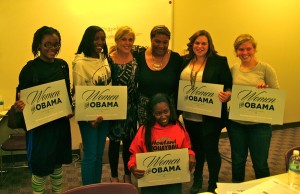By Taylor Stoudt
Transcript Reporter

Kate Chapek, National Women’s Vote Director for the Obama campaign, spoke to students and faculty about issues effecting women from abortion rights to the Fair Pay Act.
“This is the first campus that we’re doing this kind of conversation with,” said Chapek. “But this type of setting is modeled after what we’ve been doing for our women’s program all over the country. Really starting to have conversations with women about what’s at stake in this election.”
No time was wasted in building the connection between the people in the room and the relevance of the topic at hand.
In his introduction to the event, Michael Deininger-Bell, a member of the Obama campaign working specifically with Ohio Wesleyan, emphasized Ohio’s role in the election.
“Ohio is the number one state in this upcoming election,” Deininger-Bell said. “Really how this state goes, that’s how the election is going to go. So your voice and your vote are really more important than you can imagine.”
As a swing state with 18 electoral votes, winning Ohio will be a significant victory for the presidential candidate who wins the state. Democratic voters were also warned of the significance of their vote in such a conservative county as Delaware.
Besides the impact of political party, the influence women have on the outcome of the election was also discussed. Women make up a majority of the United States population as well as voters.
“The president can’t win the election without the women’s vote,” Chapek said. “He won the women’s vote in 2008. Women are the majority in this country, we are the majority of the electorate. We decide elections. So that means the women in Ohio are that much more important.”
Winning the women vote may pose a problem for Obama though. While in 2008, Obama support among the women of the country was 56 percent, that support dropped to 48 percent in 2010. Also, in 2010 republican women had the highest electoral presence in the last 30 years.
This, however, does not mean that Romney has gained female support. In a survey conducted by Quinnipiac University, Obama was shown to lead Romney with 56 percent to 38 percent of female voters.
Chapek also spoke about the power women have on influencing one another, saying women trust and rely on women like themselves to determine how they will vote.
“So not only does that mean we decide elections but we influence the outcome of elections based on the relationships we have every single day,” Chapek said.
Throughout the lecture, several issues that effect women were touched upon, many surrounding economic issues, such as fair pay. The issue recognized by the audience as the most pressing, however, was healthcare.
“Our healthcare as women is about our economic independence,” Chapek said. “It’s about our reproductive choices and freedoms. It’s about our lives.”
While insurance companies may charge up to twice as much for women to be covered by insurance, Affordable Care has provided 2.1 million Ohio residence with free preventative services like mammograms, cancer screenings, and immunizations freeing people from having to make the decision between getting the health services they need and other necessities like food because they can’t afford both.
However, despite the casual and energetic atmosphere of the lecture, the topic that stopped the laughter and seemed to provoke a sense of desperate urgency was the issue of a woman’s right to make decisions for herself concerning her body.
“The republican party has promised that they will overturn Roe v. Wade,” Chapek said. “They put it on their republican platform saying that they will ban abortion even in cases of rape and incest, and here’s the big piece, regardless, of the life of the mother. That’s what’s at stake here, and it’s terrifying.”
This topic is what turned the lecture into a conversation between Chapek and the audience. Members of the audience began to chime in about bill proposals sentencing women to life sentences for receiving abortions and mentioning the lack of governmental support for women once giving birth to her child.
Audience member senior Carly Shields said, “We don’t want to go back to years before when women were going underground and bleeding to death and dying from infections.”
Just as the speech was opened, Chapek closed her speech by reinforcing the relevance of the issues at hand with the members of the audience.
“You need to be thinking about what you want your life to look like when you step off this campus,” Chapek said. “Do you want to have a good job, do you want to be paid fairly for being a women doing equal work, do you want to have affordable access to healthcare, and do you want to be able to choose how and when you have a child?”